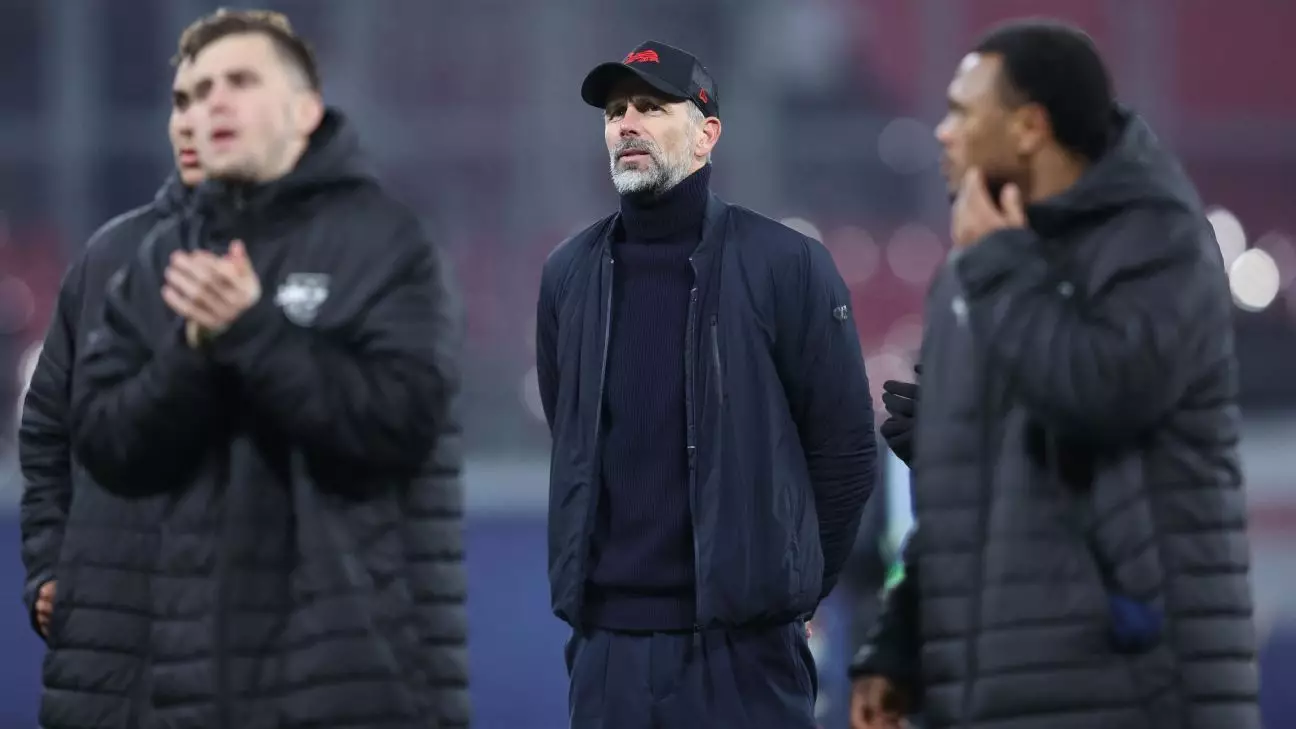In the realm of German football, the vocabulary often centers around the verb “passen,” which translates to a fitting or compatible relationship between entities. This concept applies particularly to the dynamic between coaches and teams. When a coach is said to “passen” zur Mannschaft, it reflects a celebration of alignment and harmony within the squad. Navigating this landscape comes with an inherent risk; there are no certainties when appointments are either made or vacated. Marco Rose epitomizes this notion, standing as a quintessential example of someone who aligns seamlessly with RB Leipzig’s ethos and ambitions.
Originating from Leipzig itself, Rose is more than just a coach; he embodies the soul of a club that has grown rapidly in stature since its inception in 2009. His previous experience at RB Salzburg not only familiarized him with the Red Bull philosophy but also provided him with a nuanced understanding of high-pressure environments. Unlike many predecessors, Rose’s coaching style transcends rigid tactical frameworks. While he is an advocate of Gegenpressing and transitional football, he weaves in pragmatism to adapt to varying challenges, showcasing a versatile coaching acumen that is crucial for success at Leipzig.
The landscape at Leipzig has been characterized by a string of tumultuous shifts in management, particularly since Oliver Mintzlaff became the cornerstone of decision-making. In a club famous for rapid changes, the average coach’s tenure is precarious. Instances like those of Jesse Marsch and Domenico Tedesco serve as cautionary tales; significant achievements like cup victories and semi-final appearances failed to secure their positions long-term. Yet, Marco Rose has managed to defy expectations, clocking in over 826 days at the helm, which only emphasizes his role in stabilizing the team amidst the tumult.
His time has not been without its ups and downs, however. Leipzig’s recent performance in the UEFA Champions League has been alarming. The team has suffered a slew of losses that starkly highlight the weight of expectations placed upon them. The successive defeats have only intensified scrutiny on Rose’s ability to navigate these high-stakes scenarios, with injury woes compounding the pressure. The discourse surrounding a potential “Trainerdiskussion” (discussion about the coach) has resurfaced, particularly amid the looming Winterpause, which often serves as a pivotal juncture for managerial assessments.
Despite visible struggles on an international stage, there have been glimmers of hope within domestic competitions. Most notably, the DFB-Pokal has offered an avenue for redemption. In a recent quarterfinal against Eintracht Frankfurt, Leipzig exhibited a resounding performance, potentially alleviating some of the mounting pressure on Rose. The contributions of players like Loïs Openda and Benjamin Sesko spoke volumes about the team’s resilience and ability to rise to the occasion in clutch moments.
As the DFB-Pokal quarterfinal draw approaches, the squad enters the fray with renewed optimism. With fierce domestic rivals such as Bayern Munich and Borussia Dortmund eliminated, Leipzig finds itself in a favorable position to claim yet another trophy, driven by a sense of urgency and ambition. This paradox—a club reeling from European defeats yet flourishing domestically—only enhances the ongoing narrative of their unpredictable season.
Looking towards the future, speculation about managerial changes continues to linger, particularly as Roger Schmidt, with Red Bull connections, and others like Erik ten Hag are available. The looming influence of Jürgen Klopp as he prepares to step into a global role within Red Bull’s structure adds another layer of complexity to the scenario. Should changes materialize before Klopp’s arrival, it could impact Rose’s stability and the club’s trajectory going forward.
Ultimately, the current season has highlighted the fine margins that separate triumph from turmoil. Leipzig’s ambition remains unabated despite setbacks, demonstrating a commitment to building a competitive squad while navigating the volatile waters of modern football. The blend of promising talent and a determined tactical approach under Rose has the potential to yield success, but the club must consistently rise to meet the high expectations from both their fanbase and the footballing community at large.
In sum, while challenges persist and uncertainties loom, RB Leipzig stands on the brink of another pivotal chapter in their evolution. The adaptability inherent in Marco Rose’s leadership style, combined with the squad’s emerging talents, may represent a turning point leading to both domestic success and, possibly, a resurgence on the European stage.
